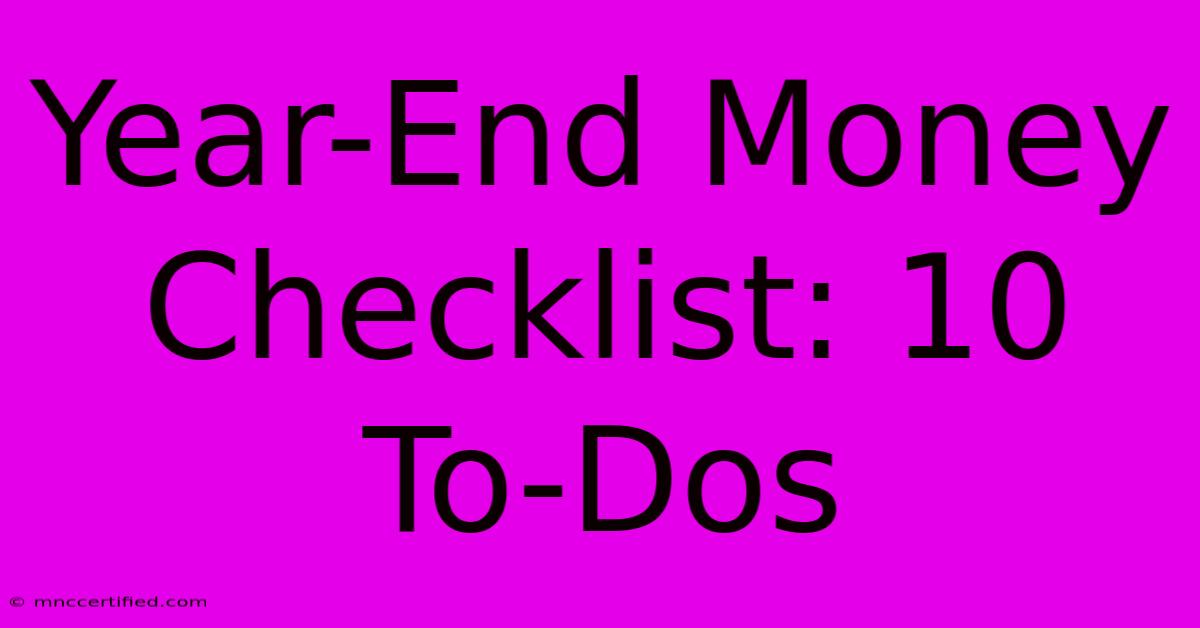Year-End Money Checklist: 10 To-Dos

Table of Contents
Year-End Money Checklist: 10 To-Dos to Secure Your Financial Future
The year is winding down, and with it comes the perfect opportunity for a financial spring cleaning. A year-end money checklist is crucial for optimizing your finances and setting yourself up for success in the new year. Ignoring these essential tasks could mean missing out on valuable tax breaks, leaving money on the table, and potentially facing unforeseen financial challenges. This comprehensive guide outlines ten crucial to-dos to help you confidently navigate the year's end and prepare for a financially secure future.
1. Review Your Budget and Spending Habits
Before diving into more complex financial tasks, take time to analyze your spending habits throughout the year. Use budgeting apps, spreadsheets, or even good old-fashioned pen and paper to track your income and expenses. Identifying areas of overspending can help you create a more effective budget for the coming year. This crucial step provides a solid foundation for informed financial decisions. Keyword: Budget review, spending analysis, financial planning.
2. Maximize Retirement Contributions
Don't miss out on valuable tax advantages! Check if you've maxed out your contributions to your 401(k), IRA, or other retirement accounts. Contributing the maximum allowed can significantly reduce your taxable income and boost your long-term savings. Understanding contribution limits and deadlines is essential for maximizing your retirement savings. Keyword: Retirement planning, 401k, IRA contributions, tax advantages.
3. Review Your Investment Portfolio
Take a thorough look at your investment portfolio. Have your investments performed as expected? Consider rebalancing your portfolio to align with your risk tolerance and long-term financial goals. This is a perfect time to address any underperforming assets and potentially adjust your investment strategy for the upcoming year. Keyword: Investment portfolio review, portfolio rebalancing, investment strategy.
4. Check Your Credit Report
Regularly checking your credit report is paramount for maintaining good financial health. Scrutinize your report for any errors or signs of identity theft. Addressing inaccuracies promptly can protect your credit score and prevent future financial difficulties. Keyword: Credit report check, credit score, identity theft protection.
5. Plan for Tax Season
Start gathering your tax documents early. This will help you accurately complete your tax return and potentially identify opportunities to reduce your tax liability. Consider consulting with a tax professional for guidance on deductions and credits you might be eligible for. Keyword: Tax planning, tax preparation, tax deductions, tax credits.
6. Pay Down High-Interest Debt
High-interest debt, like credit card debt, can significantly impact your financial well-being. Prioritize paying down this debt to reduce interest payments and improve your overall financial health. Explore debt consolidation options if managing multiple debts is proving challenging. Keyword: Debt management, debt consolidation, high-interest debt.
7. Update Beneficiaries on Accounts
Ensure your beneficiaries are up-to-date on all your accounts, including retirement accounts, life insurance policies, and bank accounts. This crucial step ensures your assets are distributed according to your wishes. Regularly reviewing and updating this information is vital. Keyword: Beneficiary designation, estate planning.
8. Schedule a Financial Check-Up
Consider scheduling a meeting with a financial advisor to review your overall financial picture. This professional consultation can provide valuable insights, helping you refine your financial goals and make informed decisions for the future. Keyword: Financial advisor, financial planning, financial consultation.
9. Set Financial Goals for the New Year
With the year ending, it’s the perfect time to set SMART (Specific, Measurable, Achievable, Relevant, Time-bound) financial goals for the new year. Whether it's saving for a down payment, paying off debt, or investing more, clearly defined goals provide direction and motivation. Keyword: Financial goal setting, SMART goals, financial resolutions.
10. Review Insurance Coverage
Review your insurance coverage, including health, home, auto, and life insurance. Ensure your policies still meet your needs and adjust coverage as necessary. This proactive approach protects you from unexpected financial burdens. Keyword: Insurance review, insurance coverage, risk management.
By diligently following this year-end money checklist, you can significantly improve your financial health and set the stage for a prosperous new year. Remember, proactive financial management is key to long-term financial security. Don't wait – start planning today!

Thank you for visiting our website wich cover about Year-End Money Checklist: 10 To-Dos. We hope the information provided has been useful to you. Feel free to contact us if you have any questions or need further assistance. See you next time and dont miss to bookmark.
Featured Posts
-
Atlas Holding The World Meme
Nov 30, 2024
-
Louise Haighs Resignation
Nov 30, 2024
-
Actress Hailee Steinfeld Gets Engaged
Nov 30, 2024
-
Ole Miss Harris Late Hit Penalty
Nov 30, 2024
-
What Is Industrial Insurance
Nov 30, 2024